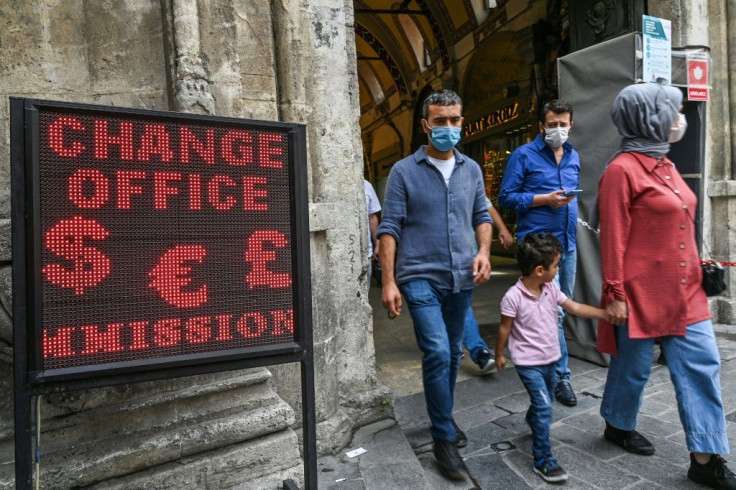Turkey Hikes Interest Rate For First Time Since 2018
Turkey's central bank stunned and cheered investors Thursday by raising its key interest rate for the first time in two years to pry the lira up from historic lows.
Economists said the one-week repo rate increase from 8.25 to 10.25 percent also helped the bank reclaim some independence in the face of President Recep Tayyip Erdogan's firm opposition to higher rates.
The bank had tried to use discrete currency support measures such as changes to overnight borrowing costs to avoid formally hiking the main rate.
But that approach failed to prevent the lira from losing 22 percent of its value against the dollar this year and becoming one of the worst emerging market performers in the world.
The pace of its decline accelerated in the past few weeks as foreign investors fled the market and Turkish nationals bought up dollars and euros to preserve their savings.
"Massive surprise, and positive," said BlueBay Asset Management analyst Timothy Ash.
Capital Economics said the decision "should help to restore the bank's battered credibility".
Turkey last raised its main rate in September 2018 while it was reeling from an even deeper currency crisis sparked by a sharp deterioration in relations with the United States.
Economists attribute the current downturn to a general economic malaise caused by the coronavirus pandemic and a sharp drop in Turkey's foreign currency reserves.
The Moody's ratings agency estimated that the central bank's attempts to prop up the lira have seen Turkey's stockpile of dollars and euros shrink to a 20-year low.

It downgraded Ankara's sovereign credit rating further into junk status at B2 -- the same level as nations such as Bolivia and Egypt.
"The government has almost depleted the buffers that would allow it (to) stave off a potential balance-of-payments crisis," Moody's warned.
A central bank statement said Thursday that it had "decided to increase the policy rate by 200 basis points to restore the disinflation process and support price stability".
Inflation edged up to 11.77 percent in August and has remained above 10 percent for the past few years.
This means that Turkish bank deposits and bonds lose value over time since inflation exceeds the base interest rate.
"The central bank pinned its decision on concerns over inflation," Capital Economics analyst Jason Tuvey wrote in a research note.
"But any shift in monetary policy always hinged on swings in the lira."
Tuvey noted that the rate increase could help push the average cost of funding in the coming months to 12 percent -- just above the rate of inflation and possibly enough to save the lira from further declines.
Turkey's problems are compounded by Erdogan's belief that higher interests rates cause inflation instead of slowing it down.
He once called high rates "the mother and father of all evil".
Economists said the central bank will have to do even more in the future to save the lira and support its claim of political independence.
"They are not out of the woods yet, but they have given themselves a fighting chance," Ash said.
© Copyright AFP 2024. All rights reserved.











